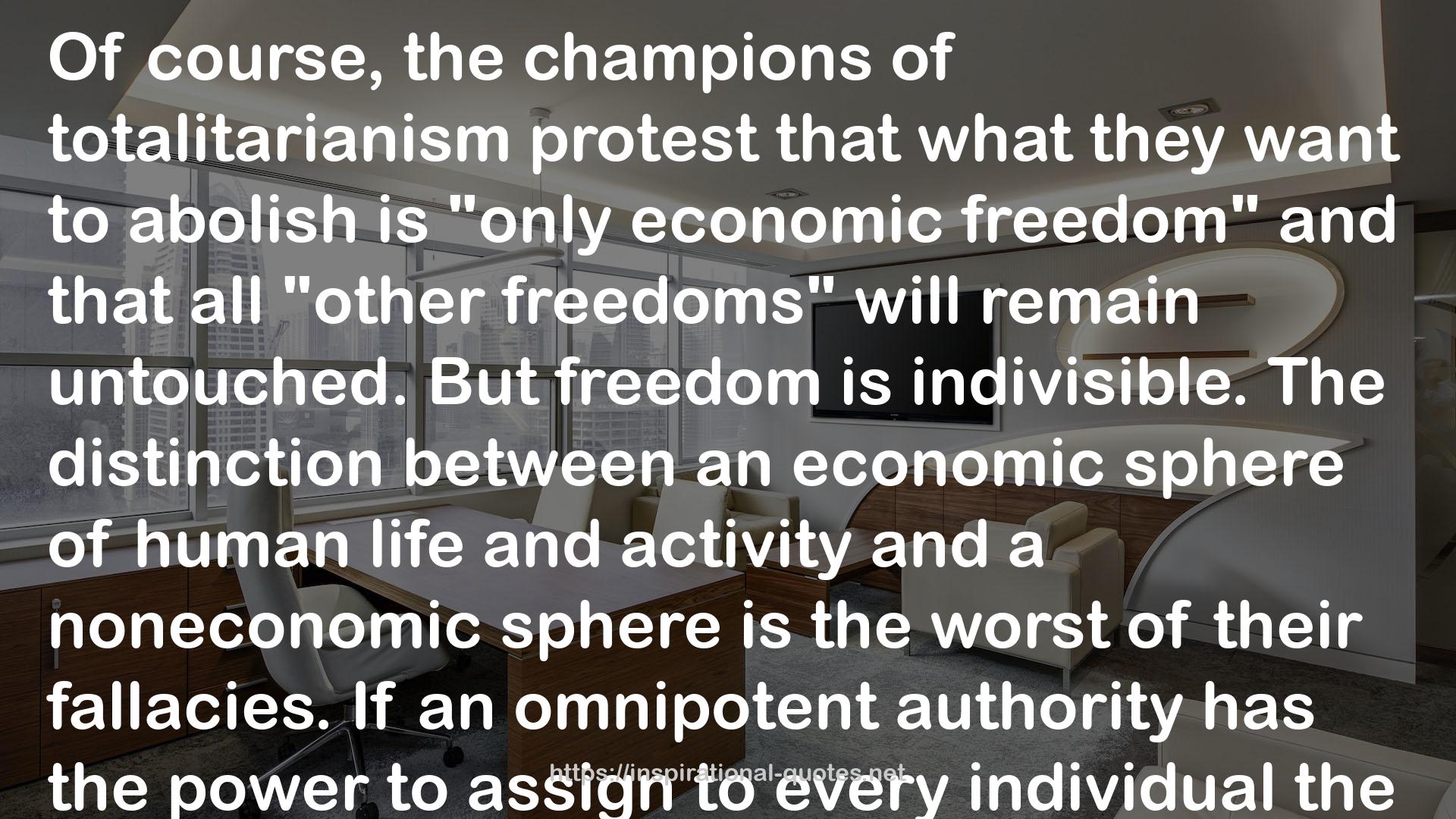" Of course, the champions of totalitarianism protest that what they want to abolish is "only economic freedom" and that all "other freedoms" will remain untouched. But freedom is indivisible. The distinction between an economic sphere of human life and activity and a noneconomic sphere is the worst of their fallacies. If an omnipotent authority has the power to assign to every individual the tasks he has to perform, nothing that can be called freedom and autonomy is left to him.
He has only the choice between strict obedience and death by starvation.1
Committees of experts may be called to advise the planning authority whether or not a young man should be given the opportunity to prepare himself for and to work in an intellectual or artistic field. But such an arrangement can merely rear disciples committed to the parrotIike repetition of the ideas of the preceding generation. It would bar innovators who disagree with the accepted ways of thought. No innovation would ever have been accomplished if its originator had been in need of an authorization by those from whose doctrines and methods he wanted to deviate. Hegel would not have ordained Schopenhauer or Feuerbach, nor would Professor Rau have ordained Marx or Carl Menger. If the supreme planning board is ultimately to determine which books are to be printed, who is to experiment in the laboratories and who is to paint or to sculpture, and which alterations in technological methods should be undertaken, there will be neither improvement nor progress. Individual man will become a pawn in the hands of the rulers, who in their "social engineering" will handle him as engineers handle the stuff of which they construct buildings, bridges, and machines. In every sphere of human activity an innovation is a challenge not only to ali routinists and to the experts and practitioners of traditional methods but even more to those who have in the past themselves been innovators.
It meets at the beginning chiefly stubborn opposition. Such obstacles can be overcome in a society where there is economic freedom. They are insurmountable in a socialist system. "
Image for Quotes
 He has only the choice between strict obedience and death by starvation.1
He has only the choice between strict obedience and death by starvation.1Committees of experts may be called to advise the planning authority whether or not a young man should be given the opportunity to prepare himself for and to work in an intellectual or artistic field. But such an arrangement can merely rear disciples committed to the parrotIike repetition of the ideas of the preceding generation. It would bar innovators who disagree with the accepted ways of thought. No innovation would ever have been accomplished if its originator had been in need of an authorization by those from whose doctrines and methods he wanted to deviate. Hegel would not have ordained Schopenhauer or Feuerbach, nor would Professor Rau have ordained Marx or Carl Menger. If the supreme planning board is ultimately to determine which books are to be printed, who is to experiment in the laboratories and who is to paint or to sculpture, and which alterations in technological methods should be undertaken, there will be neither improvement nor progress. Individual man will become a pawn in the hands of the rulers, who in their "social engineering" will handle him as engineers handle the stuff of which they construct buildings, bridges, and machines. In every sphere of human activity an innovation is a challenge not only to ali routinists and to the experts and practitioners of traditional methods but even more to those who have in the past themselves been innovators.
It meets at the beginning chiefly stubborn opposition. Such obstacles can be overcome in a society where there is economic freedom. They are insurmountable in a socialist system." style="width:100%;margin:20px 0;"/>